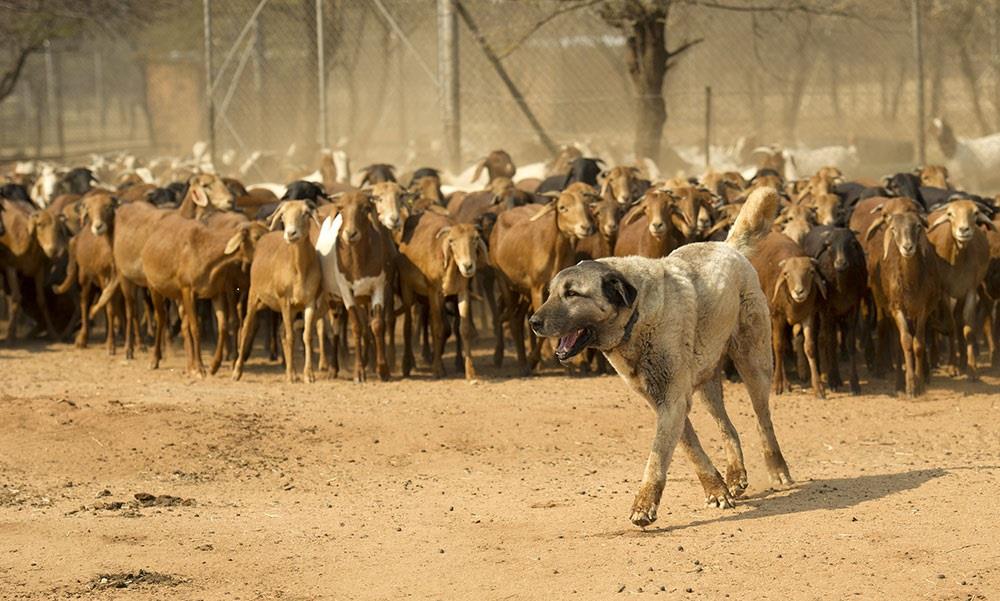Livestock guard dogs reduce stock losses
ELLANIE SMIT
WINDHOEK
Farmers in Namibia making use of livestock guard dogs have reported that this non-lethal predator control method has significantly reduced livestock losses.
The Cheetah Conservation Fund (CCF) has placed 634 livestock guard dogs with commercial farmers in Namibia over a period of 25 years from 1994 to 2018, reducing stock losses significantly for at least 91% of the farmers who made use of the dogs.
Since 1994, the CCF has implemented a Livestock Guarding Dog programme in Namibia that specifically aims to protect cheetahs, while mutually benefitting surrounding farming communities and other predators by mitigating human-predator conflict.
Effective
A long-term study compiled by CCF researchers looked back at data collected over two-and-a-half decades to draw conclusions on the impact of this non-lethal predator control tool for small stock farmers.
In addition to highlighting the success of these dogs in preventing livestock losses, the study, published online in the Journal of Vertebrate Biology, informs current CCF initiatives to adapt this concept for other cheetah range countries in Africa and for other predator species around the world.
The responses from more than 1 500 farmer surveys conducted between 1994 and 2018 were compiled and analysed by the CCF research team.
The farms where the dogs were placed were mostly located in the north-central area of Namibia.
The majority of farmers reported that, in the year before the placement of the livestock guarding dogs, they suffered between one and five livestock losses (24%) and six to ten livestock losses (30%) per year. In the year following placement of the dogs, the majority of farmers (67%) reported no annual livestock losses.
According to the CCF, aside from reducing livestock losses, the main benefits of having livestock guard dogs are reported as preventing conflict, encouraging co-existence, maintaining viable predator populations and preventing destabilisation of Namibian ecosystems.
“Cheetahs hunt by day and exist mainly on open farmlands, so they are at a greater risk of conflict with livestock farmers than other large carnivores.”
Dr Laurie Marker, CCF's Founder and Executive Director, says that with fewer than 7 500 cheetahs in the wild and with Namibia's tourism industry dependent on having healthy populations, helping farmers develop non-lethal approaches to control predation is critical.
“The CCF Livestock Guarding Dog Programme was born from the need to reduce losses and facilitate co-existence. This has been central to CCF's work from the beginning.”
CCF breeds, trains and places livestock guard dogs with Namibian farmers in exchange for a small fee. CCF works with farmers throughout the dog's career, providing regular health check-ups and retraining or rehoming dogs when necessary.
Raised at CCF with goats and sheep, the dogs form bonds with the small stock they are engaged to protect. When guarding herds in the field, the bark of one of these dogs is most often enough to warn off predators. But if engaged, the dogs are known to instinctively defend their animals.
WINDHOEK
Farmers in Namibia making use of livestock guard dogs have reported that this non-lethal predator control method has significantly reduced livestock losses.
The Cheetah Conservation Fund (CCF) has placed 634 livestock guard dogs with commercial farmers in Namibia over a period of 25 years from 1994 to 2018, reducing stock losses significantly for at least 91% of the farmers who made use of the dogs.
Since 1994, the CCF has implemented a Livestock Guarding Dog programme in Namibia that specifically aims to protect cheetahs, while mutually benefitting surrounding farming communities and other predators by mitigating human-predator conflict.
Effective
A long-term study compiled by CCF researchers looked back at data collected over two-and-a-half decades to draw conclusions on the impact of this non-lethal predator control tool for small stock farmers.
In addition to highlighting the success of these dogs in preventing livestock losses, the study, published online in the Journal of Vertebrate Biology, informs current CCF initiatives to adapt this concept for other cheetah range countries in Africa and for other predator species around the world.
The responses from more than 1 500 farmer surveys conducted between 1994 and 2018 were compiled and analysed by the CCF research team.
The farms where the dogs were placed were mostly located in the north-central area of Namibia.
The majority of farmers reported that, in the year before the placement of the livestock guarding dogs, they suffered between one and five livestock losses (24%) and six to ten livestock losses (30%) per year. In the year following placement of the dogs, the majority of farmers (67%) reported no annual livestock losses.
According to the CCF, aside from reducing livestock losses, the main benefits of having livestock guard dogs are reported as preventing conflict, encouraging co-existence, maintaining viable predator populations and preventing destabilisation of Namibian ecosystems.
“Cheetahs hunt by day and exist mainly on open farmlands, so they are at a greater risk of conflict with livestock farmers than other large carnivores.”
Dr Laurie Marker, CCF's Founder and Executive Director, says that with fewer than 7 500 cheetahs in the wild and with Namibia's tourism industry dependent on having healthy populations, helping farmers develop non-lethal approaches to control predation is critical.
“The CCF Livestock Guarding Dog Programme was born from the need to reduce losses and facilitate co-existence. This has been central to CCF's work from the beginning.”
CCF breeds, trains and places livestock guard dogs with Namibian farmers in exchange for a small fee. CCF works with farmers throughout the dog's career, providing regular health check-ups and retraining or rehoming dogs when necessary.
Raised at CCF with goats and sheep, the dogs form bonds with the small stock they are engaged to protect. When guarding herds in the field, the bark of one of these dogs is most often enough to warn off predators. But if engaged, the dogs are known to instinctively defend their animals.




Comments
Namibian Sun
No comments have been left on this article